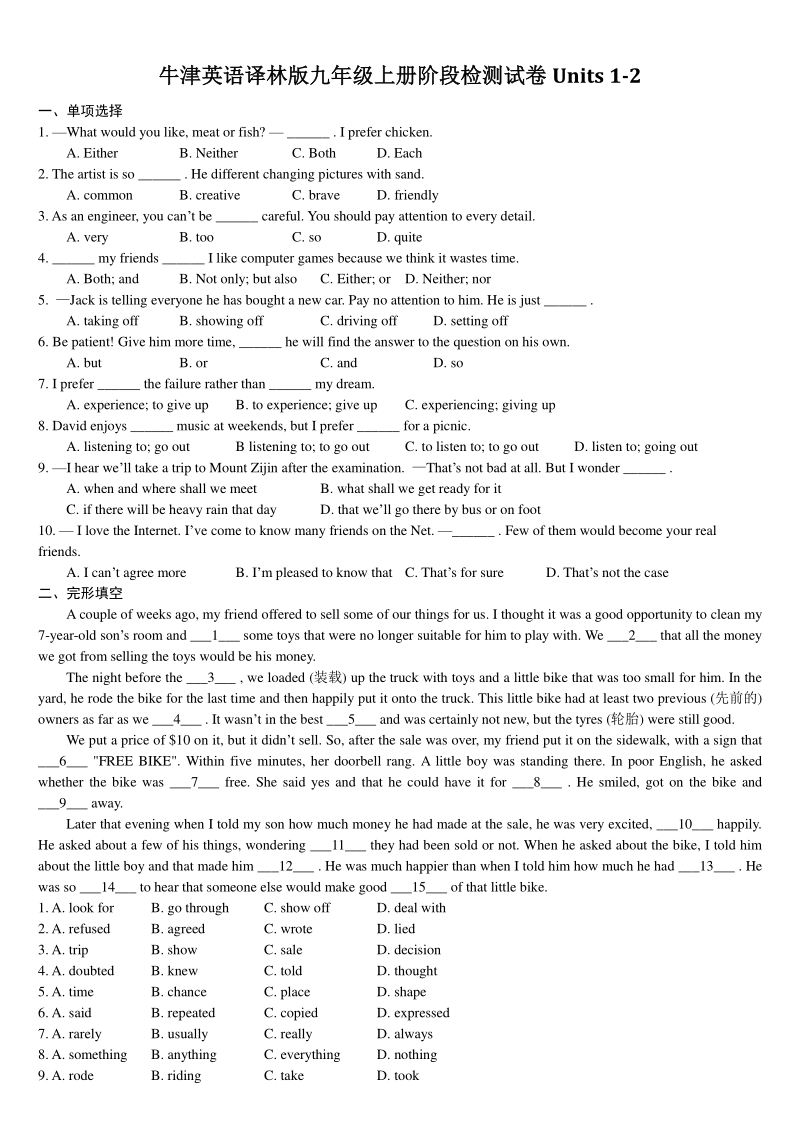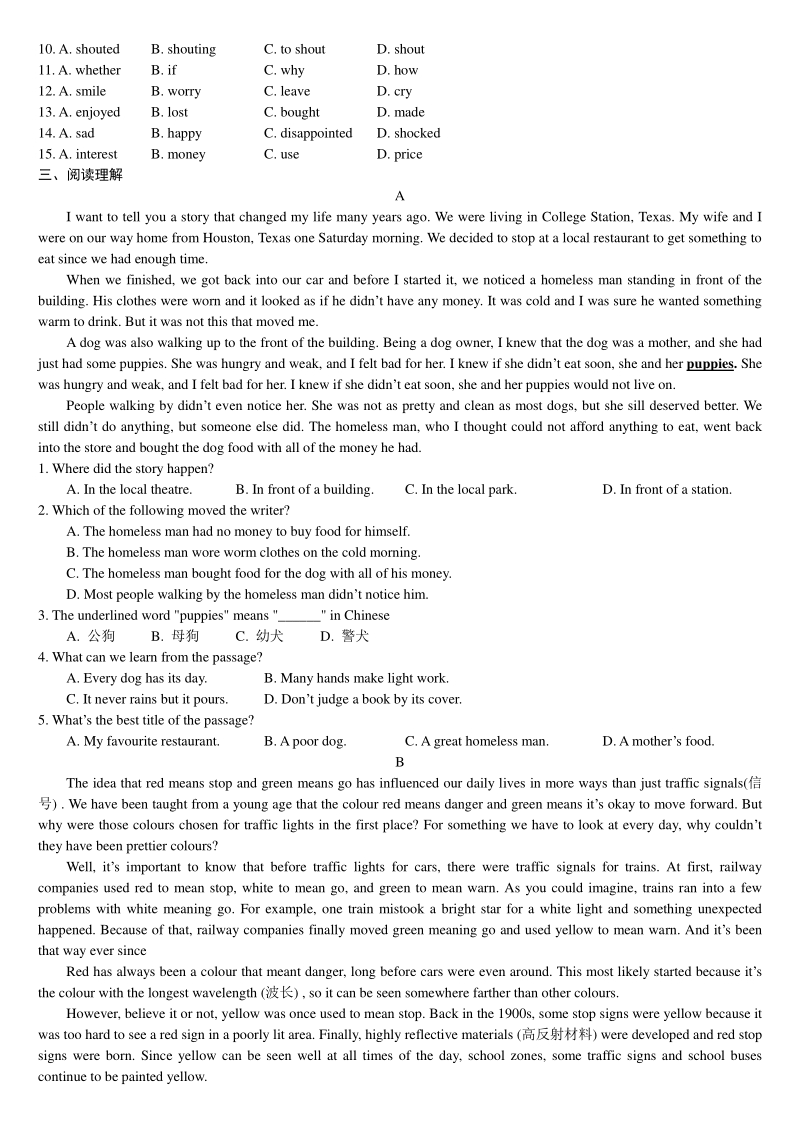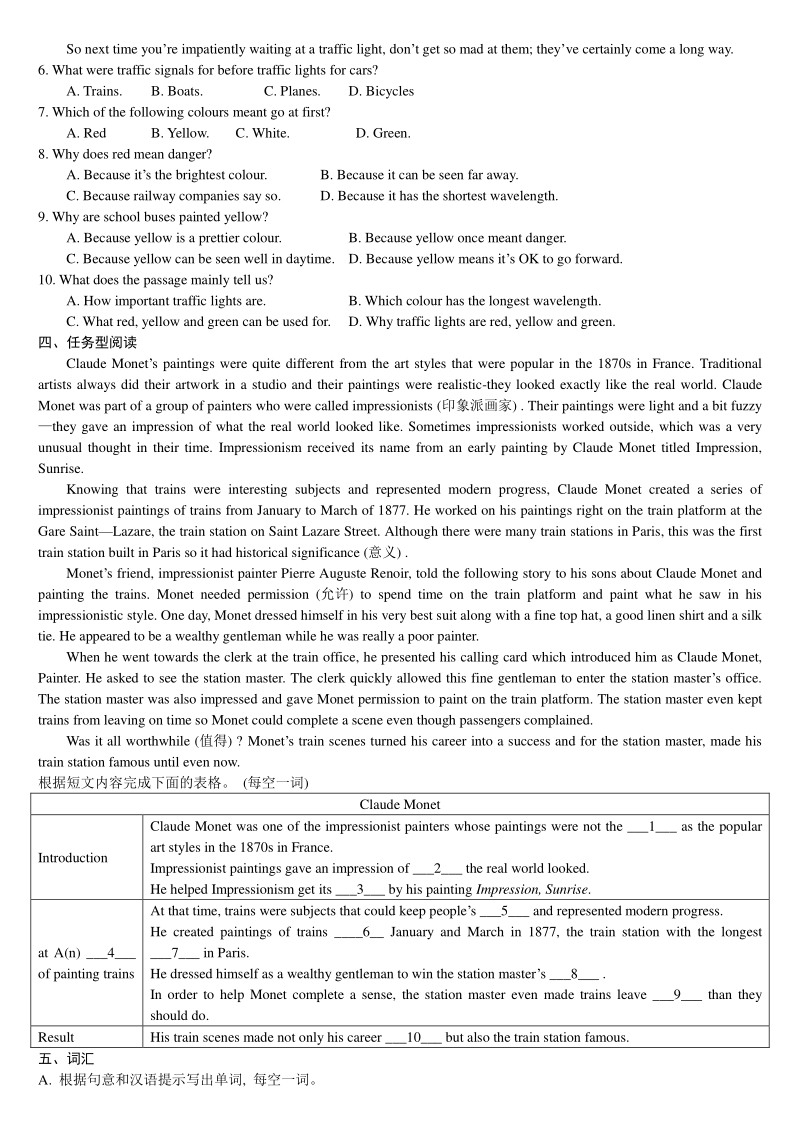 2020年秋牛津英语译林版九年级上册阶段检测试卷(Units1-2)含答案
2020年秋牛津英语译林版九年级上册阶段检测试卷(Units1-2)含答案
《2020年秋牛津英语译林版九年级上册阶段检测试卷(Units1-2)含答案》由会员分享,可在线阅读,更多相关《2020年秋牛津英语译林版九年级上册阶段检测试卷(Units1-2)含答案(6页珍藏版)》请在七七文库上搜索。
1、牛津英语译林版九年级上册牛津英语译林版九年级上册阶段阶段检测试卷检测试卷 Units 1-2 一、单项选择 1. What would you like, meat or fish? _ . I prefer chicken. A. Either B. Neither C. Both D. Each 2. The artist is so _ . He different changing pictures with sand. A. common B. creative C. brave D. friendly 3. As an engineer, you cant be _ careful
2、. You should pay attention to every detail. A. very B. too C. so D. quite 4. _ my friends _ I like computer games because we think it wastes time. A. Both; and B. Not only; but also C. Either; or D. Neither; nor 5. Jack is telling everyone he has bought a new car. Pay no attention to him. He is just
3、 _ . A. taking off B. showing off C. driving off D. setting off 6. Be patient! Give him more time, _ he will find the answer to the question on his own. A. but B. or C. and D. so 7. I prefer _ the failure rather than _ my dream. A. experience; to give up B. to experience; give up C. experiencing; gi
4、ving up 8. David enjoys _ music at weekends, but I prefer _ for a picnic. A. listening to; go out B listening to; to go out C. to listen to; to go out D. listen to; going out 9. I hear well take a trip to Mount Zijin after the examination. Thats not bad at all. But I wonder _ . A. when and where sha
5、ll we meet B. what shall we get ready for it C. if there will be heavy rain that day D. that well go there by bus or on foot 10. I love the Internet. Ive come to know many friends on the Net. _ . Few of them would become your real friends. A. I cant agree more B. Im pleased to know that C. Thats for
6、 sure D. Thats not the case 二、完形填空 A couple of weeks ago, my friend offered to sell some of our things for us. I thought it was a good opportunity to clean my 7-year-old sons room and _1_ some toys that were no longer suitable for him to play with. We _2_ that all the money we got from selling the t
7、oys would be his money. The night before the _3_ , we loaded (装载) up the truck with toys and a little bike that was too small for him. In the yard, he rode the bike for the last time and then happily put it onto the truck. This little bike had at least two previous (先前的) owners as far as we _4_ . It
8、 wasnt in the best _5_ and was certainly not new, but the tyres (轮胎) were still good. We put a price of $10 on it, but it didnt sell. So, after the sale was over, my friend put it on the sidewalk, with a sign that _6_ FREE BIKE. Within five minutes, her doorbell rang. A little boy was standing there
9、. In poor English, he asked whether the bike was _7_ free. She said yes and that he could have it for _8_ . He smiled, got on the bike and _9_ away. Later that evening when I told my son how much money he had made at the sale, he was very excited, _10_ happily. He asked about a few of his things, wo
10、ndering _11_ they had been sold or not. When he asked about the bike, I told him about the little boy and that made him _12_ . He was much happier than when I told him how much he had _13_ . He was so _14_ to hear that someone else would make good _15_ of that little bike. 1. A. look for B. go throu
11、gh C. show off D. deal with 2. A. refused B. agreed C. wrote D. lied 3. A. trip B. show C. sale D. decision 4. A. doubted B. knew C. told D. thought 5. A. time B. chance C. place D. shape 6. A. said B. repeated C. copied D. expressed 7. A. rarely B. usually C. really D. always 8. A. something B. any
12、thing C. everything D. nothing 9. A. rode B. riding C. take D. took 10. A. shouted B. shouting C. to shout D. shout 11. A. whether B. if C. why D. how 12. A. smile B. worry C. leave D. cry 13. A. enjoyed B. lost C. bought D. made 14. A. sad B. happy C. disappointed D. shocked 15. A. interest B. mone
13、y C. use D. price 三、阅读理解 A I want to tell you a story that changed my life many years ago. We were living in College Station, Texas. My wife and I were on our way home from Houston, Texas one Saturday morning. We decided to stop at a local restaurant to get something to eat since we had enough time.
14、 When we finished, we got back into our car and before I started it, we noticed a homeless man standing in front of the building. His clothes were worn and it looked as if he didnt have any money. It was cold and I was sure he wanted something warm to drink. But it was not this that moved me. A dog
15、was also walking up to the front of the building. Being a dog owner, I knew that the dog was a mother, and she had just had some puppies. She was hungry and weak, and I felt bad for her. I knew if she didnt eat soon, she and her puppies. She was hungry and weak, and I felt bad for her. I knew if she
16、 didnt eat soon, she and her puppies would not live on. People walking by didnt even notice her. She was not as pretty and clean as most dogs, but she sill deserved better. We still didnt do anything, but someone else did. The homeless man, who I thought could not afford anything to eat, went back i
17、nto the store and bought the dog food with all of the money he had. 1. Where did the story happen? A. In the local theatre. B. In front of a building. C. In the local park. D. In front of a station. 2. Which of the following moved the writer? A. The homeless man had no money to buy food for himself.
18、 B. The homeless man wore worm clothes on the cold morning. C. The homeless man bought food for the dog with all of his money. D. Most people walking by the homeless man didnt notice him. 3. The underlined word puppies means _ in Chinese A. 公狗 B. 母狗 C. 幼犬 D. 警犬 4. What can we learn from the passage?
19、 A. Every dog has its day. B. Many hands make light work. C. It never rains but it pours. D. Dont judge a book by its cover. 5. Whats the best title of the passage? A. My favourite restaurant. B. A poor dog. C. A great homeless man. D. A mothers food. B The idea that red means stop and green means g
20、o has influenced our daily lives in more ways than just traffic signals(信 号) . We have been taught from a young age that the colour red means danger and green means its okay to move forward. But why were those colours chosen for traffic lights in the first place? For something we have to look at eve
21、ry day, why couldnt they have been prettier colours? Well, its important to know that before traffic lights for cars, there were traffic signals for trains. At first, railway companies used red to mean stop, white to mean go, and green to mean warn. As you could imagine, trains ran into a few proble
22、ms with white meaning go. For example, one train mistook a bright star for a white light and something unexpected happened. Because of that, railway companies finally moved green meaning go and used yellow to mean warn. And its been that way ever since Red has always been a colour that meant danger,
23、 long before cars were even around. This most likely started because its the colour with the longest wavelength (波长) , so it can be seen somewhere farther than other colours. However, believe it or not, yellow was once used to mean stop. Back in the 1900s, some stop signs were yellow because it was



- 配套讲稿:
如PPT文件的首页显示word图标,表示该PPT已包含配套word讲稿。双击word图标可打开word文档。
- 特殊限制:
部分文档作品中含有的国旗、国徽等图片,仅作为作品整体效果示例展示,禁止商用。设计者仅对作品中独创性部分享有著作权。
- 关 键 词:
- 2020 牛津 英语 译林版 九年级 上册 阶段 检测 试卷 Units1 答案
 七七文库所有资源均是用户自行上传分享,仅供网友学习交流,未经上传用户书面授权,请勿作他用。
七七文库所有资源均是用户自行上传分享,仅供网友学习交流,未经上传用户书面授权,请勿作他用。



 浙公网安备33030202001339号
浙公网安备33030202001339号
链接地址:https://www.77wenku.com/p-153762.html